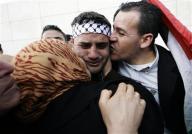 RAMALLAH, West Bank (Reuters) – Israel released 224 prisoners in a goodwill gesture to Palestinian President Mahmoud Abbas on Monday, prompting joyous family reunions in the West Bank and Gaza Strip.
RAMALLAH, West Bank (Reuters) – Israel released 224 prisoners in a goodwill gesture to Palestinian President Mahmoud Abbas on Monday, prompting joyous family reunions in the West Bank and Gaza Strip.
Families sang and danced as prison buses rolled up full of newly freed men, shouting and waving from the windows, and mothers wept as they embraced their children.
Abbas greeted them individually with kisses on the cheeks at his office in Ramallah, the seat of his government, but said Israel should release all Palestinians it was holding.
“Our happiness will not be complete until all of the 11,000 prisoners are freed,” he said. “We promise you we will work to free all prisoners from all factions.”
The president said that pledge included members of the hardline Islamist group Hamas, which drove his Fatah faction out of the Gaza Strip last year and now controls the territory.
Egyptian-mediated talks to try to heal the rift between Fatah and Hamas have made no visible progress in the past few months.
“Today some of our brothers were released and sent back to their homes in the beloved Gaza Strip. We hope to God they were not freed from one prison only to enter another,” Abbas added.
CONFIDENCE BUILDING
Israel aims to reward Fatah and bolster the popularity of Abbas, who is seeking peace with the Jewish state and the creation of a Palestinian state alongside it, while punishing Hamas as long as it clings to armed resistance and rejection of Israel.
“We hope these releases will be seen as an important confidence-building measure designed to strengthen the trust and the confidence in the (peace) negotiations,” said Mark Regev, a spokesman for Israeli Prime Minister Ehud Olmert.
Israel had released about 1,000 Palestinian prisoners since last year, including 200 in August, Regev said. He did not say how many more had been arrested in the same period. He confirmed that no Hamas members were freed on Monday.
Most came from the Ofer Prison in the Israeli-occupied West Bank. U.S.-sponsored peace talks between Olmert and Abbas, which are rejected by Hamas, have shown little sign of progress.
A group of 18 were taken by bus from a prison in the southern Israeli town of Ashkelon into Gaza.
“My happiness cannot be described. My happiness is like nothing else in the world. I cannot talk, I cannot talk,” said the mother of Fatah member Mohammed Abdu, who served seven years of a 13-year sentence.
Friends and relatives hoisted him on their shoulders as families embraced on the Gaza side of Israel’s Erez checkpoint which controls access to the blockaded strip. They draped a black-and-white checked keffiya headdress over his shoulders.
The Israelis “should not be discriminating” between Fatah and Hamas, Abdu’s mother said. “They should all be released.”
 Eurasia Press & News
Eurasia Press & News